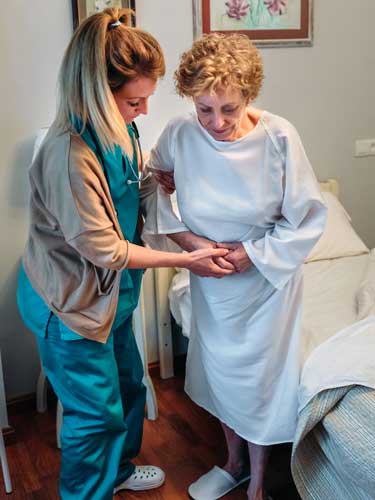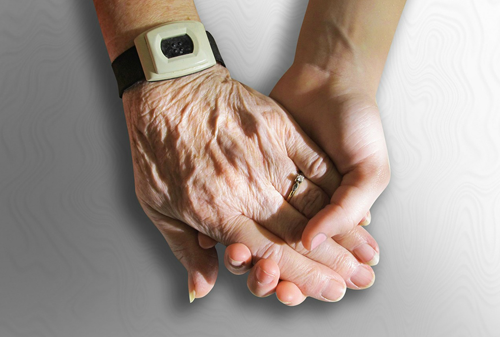




Safeguarding is about working with children, young people and adults to identify possible dangers to enable them to keep themselves safe from harm, abuse or neglect. It is also about ensuring the provision of safe and effective care, preventing any impairment in health and development and promoting well-being, voice, choice and control.
Safeguarding includes a need to recognise signs of potential harm, abuse or neglect and reporting concerns by following the organisation’s safeguarding procedure. It is important to promote trust to enable individuals to feel safe to disclose information that will enable them to keep themselves safe.
The Social Services and Well-being (Wales) Act defines a child as someone under the age of eighteen and an adult as someone over the age of eighteen. This unit is going to provide an overview of safeguarding in relation to children, young people and adults. They will sometimes be referred to as ‘individuals’ unless stated otherwise, i.e. an issue specifically relates to children and young people or adults.
The word ‘individual’ is used in the Act to stress that everyone is unique with different care and support needs. It is very important to have clear definitions from the outset because these definitions stem from relevant legislation and Welsh Government policy.
Safeguarding is everyone’s responsibility. Workers and volunteers have to be trained to know the signs and symptoms of abuse or neglect, how to respond and where to go for advice and support.
Internally this can be from their manager and the organisation’s safeguarding procedures.
Externally a manager might contact local authority Social Services to report a safeguarding concern or access information provided by Social Services or a Regional Safeguarding Board.
There are six Regional Safeguarding Boards in Wales that have a number of agencies that work together to prevent and overcome harm, abuse or neglect in a specific area.
Workers need to know who to contact about safeguarding outside their organisation in case they believe that it is not fulfilling its safeguarding responsibility. It may be that safeguarding procedures are being ignored or there are concerns about the conduct of some workers or the organisation’s leadership. Safeguarding promotes child-centred and person-centred practice by requiring organisations and workers to make sure that the health, well-being and safety of individuals is central to their service delivery.
Mae diogelu yn ymwneud â gweithio gyda phlant, pobl ifanc ac oedolion i nodi peryglon posibl i'w galluogi i'w cadw eu hunain yn ddiogel rhag niwed, camdriniaeth neu esgeulustod. Mae hefyd yn ymwneud â sicrhau bod gofal diogel ac effeithiol yn cael ei ddarparu, gan atal unrhyw amhariad ar iechyd a datblygiad a hyrwyddo lles, llais, dewis a rheolaeth.
Mae diogelu yn cynnwys yr angen i nodi arwyddion niwed, camdriniaeth neu esgeulustod posibl ac adrodd ar bryderon trwy ddilyn gweithdrefn ddiogelu'r sefydliad. Mae'n bwysig hyrwyddo ymddiriedaeth er mwyn galluogi unigolion i deimlo'n ddigon diogel i ddatgelu gwybodaeth a fydd yn eu galluogi i'w cadw eu hunain yn ddiogel.
Mae Deddf Gwasanaethau Cymdeithasol a Llesiant (Cymru) yn diffinio plentyn fel rhywun o dan ddeunaw oed ac oedolyn fel rhywun dros ddeunaw oed. Bydd yr uned hon yn darparu trosolwg o ddiogelu mewn perthynas â phlant, pobl ifanc ac oedolion. Weithiau cyfeirir atynt fel ‘unigolion’ oni bai y nodir yn wahanol, h.y. mae mater yn ymwneud yn benodol â phlant a phobl ifanc neu oedolion.
Defnyddir y gair ‘unigolyn’ yn y Ddeddf i bwysleisio bod pawb yn unigryw â gwahanol anghenion ynghylch gofal a chymorth. Mae'n bwysig iawn cael diffiniadau clir o'r cychwyn cyntaf oherwydd bod y diffiniadau hyn yn deillio o ddeddfwriaeth berthnasol a pholisi Llywodraeth Cymru.
Mae’n gyfrifoldeb ar bawb i ddiogelu. Rhaid hyfforddi gweithwyr a gwirfoddolwyr i adnabod arwyddion a symptomau camdriniaeth neu esgeulustod, sut i ymateb a ble i fynd i gael cyngor a chymorth.
Yn fewnol, gall hyn olygu eu rheolwr a gweithdrefnau diogelu'r sefydliad. Yn allanol, gallai rheolwr gysylltu â Gwasanaethau Cymdeithasol yr awdurdod lleol i adrodd am bryder ynghylch diogelu neu gyrchu gwybodaeth a ddarperir gan y Gwasanaethau Cymdeithasol neu Fwrdd Diogelu Rhanbarthol. Mae chwe Bwrdd Diogelu Rhanbarthol yng Nghymru sydd â nifer o asiantaethau sy'n gweithio gyda'i gilydd i atal a goresgyn niwed, camdriniaeth neu esgeulustod mewn maes penodol.
Mae angen i weithwyr wybod â phwy i gysylltu ynghylch diogelu y tu allan i'w sefydliad rhag ofn eu bod yn credu nad yw'n cyflawni ei gyfrifoldeb diogelu. Efallai fod gweithdrefnau diogelu yn cael eu hanwybyddu neu fod pryderon yn bodoli ynghylch ymddygiad rhai gweithwyr neu arweinyddiaeth y sefydliad. Mae diogelu yn hyrwyddo arfer sy'n canolbwyntio ar y plentyn ac sy'n canolbwyntio ar yr unigolyn trwy ei wneud yn ofynnol i sefydliadau a gweithwyr sicrhau bod iechyd, lles a diogelwch unigolion yn ganolog i'r modd maent yn cyflenwi gwasanaethau.

Key legislation exists in relation to safeguarding and a full summary of relevant legislation can be found on the Safeguarding Wales website:
The following legislation covers key aspects of safeguarding:
The Social Services and Well-being (Wales) Act places a duty on an organisation such as those identified on Regional Partnership Boards to inform the local authority if it suspects that a child, young person or adult is at risk under the definition provided by the Act.
When a child is reported to be at risk the local authority must use the same procedures required by Section 47 of the Children Act 1989. This places a duty on all agencies to safeguard and promote the welfare of children and includes sharing concerns at the earliest stage to take preventative action. Workers have a responsibility to act if they witness, receive information about, or have concerns about possible harm, abuse or neglect.
Local authorities have the power to make enquiries if they have reasonable cause to believe an adult is at risk. In exceptional circumstances, an ‘Adult Protection and Support Order’ can be obtained and used to ensure a proper assessment takes place. The order means that workers from the local authority can go into a building with a police officer to see the person, speak to them in private, assess their well-being including whether there is a risk of harm, abuse or neglect to decide what action should be taken next.
There is a legal requirement for Regional Safeguarding Children Boards to work as multi-agency partnerships to promote the safety and well-being of children and young people. The Boards have various responsibilities including overseeing local safeguarding arrangements and practices, Child Practice Reviews and making recommendations for improvements.
There is also a legal requirement for Regional Safeguarding Adults Boards to work as multi-agency partnerships to promote the safety and well-being of adults. The Boards have very similar responsibilities to the Safeguarding Children Boards but their focus is on individuals over the age of eighteen. They oversee local safeguarding arrangements and practices, Adult Practice Reviews and seek to promote improvements as a result of ongoing shared learning between agencies.
All Wales Safeguarding Procedures (2019) are based on the principle that the protection of children from harm is the responsibility of all individuals and agencies working with children and families and with adults who may pose a risk to children.
Mae deddfwriaeth allweddol yn bodoli mewn perthynas â diogelu a gellir gweld crynodeb llawn o'r ddeddfwriaeth berthnasol ar wefan Diogelu Cymru:
Mae'r ddeddfwriaeth ddilynol yn ymdrin ag agweddau allweddol ar ddiogelu:
Mae'r Ddeddf Gwasanaethau Cymdeithasol a Llesiant (Cymru) yn gosod dyletswydd ar sefydliad megis y rhai hynny a nodir ar Fyrddau Partneriaeth Rhanbarthol i hysbysu'r awdurdod lleol os yw'n amau bod plentyn, person ifanc neu oedolyn mewn perygl o dan y diffiniad a ddarperir gan y Ddeddf.
Pan adroddir bod plentyn mewn perygl rhaid i'r awdurdod lleol ddefnyddio'r un gweithdrefnau sy'n ofynnol gan Adran 47 Deddf Plant 1989. Mae hyn yn gosod dyletswydd ar bob asiantaeth i ddiogelu a hyrwyddo lles plant ac mae'n cynnwys rhannu pryderon ar y cam cynharaf i gymryd camau ataliol. Mae gan weithwyr gyfrifoldeb i weithredu os ydynt yn gweld, yn derbyn gwybodaeth ynghylch, neu os oes ganddynt bryderon ynghylch niwed, camdriniaeth neu esgeulustod posib.
Mae gan awdurdodau lleol y pŵer i wneud ymholiadau os oes ganddynt achos rhesymol i gredu bod oedolyn mewn perygl. O dan amgylchiadau eithriadol, gellir cael a defnyddio ‘Gorchymyn Amddiffyn a Chynorthwyo Oedolion’ i sicrhau bod asesiad cywir yn digwydd. Mae'r gorchymyn yn golygu y gall gweithwyr o'r awdurdod lleol fynd i mewn i adeilad gyda swyddog yr heddlu i weld yr unigolyn, siarad ag ef yn breifat, asesu ei les gan gynnwys a oes risg o niwed, camdriniaeth neu esgeulustod i benderfynu pa gamau y dylid eu cymryd nesaf.
Mae gofyniad cyfreithiol i Fyrddau Rhanbarthol Diogelu Plant weithio fel partneriaethau amlasiantaethol i hyrwyddo diogelwch a lles plant a phobl ifanc. Mae gan y Byrddau gyfrifoldebau amrywiol gan gynnwys goruchwylio trefniadau ac arferion diogelu lleol, Adolygiadau Ymarfer Plant a gwneud argymhellion ar gyfer gwelliannau.
Hefyd mae gofyniad cyfreithiol i Fyrddau Rhanbarthol Diogelu Plant weithio fel partneriaethau amlasiantaethol i hyrwyddo diogelwch a lles oedolion. Mae gan y Byrddau gyfrifoldebau tebyg iawn i'r Byrddau Diogelu Plant ond mae eu ffocws ar unigolion dros ddeunaw oed. Maent yn goruchwylio trefniadau ac arferion diogelu lleol, Adolygiadau Ymarfer Oedolion ac yn ceisio hyrwyddo gwelliannau o ganlyniad i ddysgu parhaus a rennir rhwng asiantaethau.
Mae Gweithdrefnau Diogelu Cymru (2019) wedi'u seilio ar yr egwyddor bod amddiffyn plant rhag niwed yn gyfrifoldeb i bob unigolyn ac asiantaeth sy'n gweithio gyda phlant a theuluoedd, ac oedolion a allai beri risg i blant.

Equality and human rights are at the core of safeguarding in the recognition that a failure to uphold them can impair individuals’ health and development. A lack of equality and human rights can also deny children, young people and adults’ sense of well-being, voice, choice and control. The Equality Act 2010 protects individuals from discrimination, harassment and victimisation as potential aspects of harm, abuse or neglect.
The Human Rights Act 1998 and United Nations Convention on the Rights of the Child contain ‘Articles’ which identify the fundamental rights and freedoms that every child, young person and adult is entitled to.
Mae cydraddoldeb a hawliau dynol wrth wraidd diogelu o ran cydnabod y gall methu â’u cynnal amharu ar iechyd a datblygiad unigolion. Hefyd gall diffyg cydraddoldeb a hawliau dynol wadu ymdeimlad o les, llais, dewis a rheolaeth i blant, pobl ifanc ac oedolion. Mae Deddf Cydraddoldeb 2010 yn amddiffyn unigolion rhag gwahaniaethu, aflonyddu ac erledigaeth fel agweddau posib ar niwed, camdriniaeth neu esgeulustod.
Mae Deddf Hawliau Dynol 1998 a Chonfensiwn y Cenhedloedd Unedig ar Hawliau’r Plentyn yn cynnwys ‘Erthyglau’ sy’n nodi’r hawliau a’r rhyddid sylfaenol y mae gan bob plentyn, person ifanc ac oedolyn hawl iddynt.

Codes of conduct and professional practice set standards and give guidance for all health and social care professionals. This includes guidance on safeguarding such as safe recruitment practices and ways of working such as supporting children, young people and adults to be safe. In Wales, the Code of Practice for Social Care Employers (Employers' Code) sets the standards for employers.
Practice guidance gives registered workers guidance related to their role. Other codes include the NHS Wales Code of Conduct for Healthcare Support Workers in Wales, the Code of Practice for NHS Wales Employers and practice guidance, such as the Practice Guidance for Residential Child Care for workers registered with Social Care Wales.
Mae codau ymddygiad ac ymarfer proffesiynol yn gosod safonau ac yn rhoi cyfarwyddyd i'r holl weithwyr proffesiynol meysydd iechyd a gofal cymdeithasol. Mae hyn yn cynnwys cyfarwyddyd ar ddiogelu megis arferion recriwtio diogel a dulliau gweithio megis cefnogi plant, pobl ifanc ac oedolion i fod yn ddiogel. Yng Nghymru, mae'r Cod Ymarfer ar gyfer Cyflogwyr Gofal Cymdeithasol (Cod y Cyflogwyr) yn gosod y safonau ar gyfer cyflogwyr.
Mae cyfarwyddyd ymarfer yn rhoi arweiniad i weithwyr cofrestredig sy'n perthyn i'w rôl. Mae codau eraill yn cynnwys Cod Ymddygiad GIG Cymru ar gyfer Gweithwyr Cymorth Gofal Iechyd yng Nghymru, y Cod Ymarfer ar gyfer Cyflogwyr GIG Cymru a chyfarwyddyd ymarfer, megis y Cyfarwyddyd Ymarfer ar gyfer Gofal Preswyl i Blant i Weithwyr sydd wedi'u Cofrestru â Gofal Cymdeithasol Cymru.

The Code of Professional Practice for Social Care consists of a list of statements describing the standards of professional conduct and practice necessary for employees in the social care profession in Wales. This includes working in ways that promote safeguarding such as acting with integrity and upholding public trust and confidence in the social care profession. The Code plays a key part in raising awareness of these standards. The Code is intended to be a guide for workers, individuals accessing services and managers of services.
In relation to individuals accessing care and support or a member of the public, the Code will make them aware of how a social care worker should behave towards them. It also notes the role of employers in supporting social care workers to do their jobs well.
Employers of social care workers are expected to promote the use of the Code and use it when making any decisions about the conduct and practice of staff.
Mae'r Cod Ymarfer Proffesiynol ar gyfer Gofal Cymdeithasol yn cynnwys rhestr o ddatganiadau sy'n disgrifio'r safonau ymddygiad ac arfer proffesiynol sy'n angenrheidiol ar gyfer gweithwyr yn y proffesiwn gofal cymdeithasol yng Nghymru. Mae hyn yn cynnwys gweithio mewn ffyrdd sy'n hyrwyddo diogelu megis gweithredu ag onestrwydd a chynnal ymddiriedaeth a hyder y cyhoedd yn y proffesiwn gofal cymdeithasol. Mae'r Cod yn chwarae rhan allweddol o ran codi ymwybyddiaeth o'r safonau hyn. Bwriad y Cod yw bod yn ganllaw i weithwyr, unigolion sy'n cyrchu gwasanaethau a rheolwyr gwasanaethau.
Mewn cysylltiad ag unigolion sy'n cyrchu gofal a chymorth neu aelod o'r cyhoedd, bydd y Cod yn eu gwneud yn ymwybodol o sut y dylai gweithiwr gofal cymdeithasol ymddwyn tuag atynt. Mae hefyd yn nodi rôl cyflogwyr o ran cefnogi gweithwyr gofal cymdeithasol i wneud eu swyddi'n dda.
Disgwylir i gyflogwyr gweithwyr gofal cymdeithasol hyrwyddo'r defnydd o'r Cod a'i ddefnyddio wrth wneud unrhyw benderfyniadau ynghylch ymddygiad ac arferion staff.

The Code of Professional Practice for Social Care is made up of seven sections.
As a social care worker, you must:
Mae Cod Ymarfer Proffesiynol Gofal Cymdeithasol yn cynnwys saith adran.
Fel gweithiwr gofal cymdeithasol, rhaid i chi:

The NHS Wales Code of Conduct for Healthcare Support Workers in Wales describes what is expected from Healthcare Support Workers employed by NHS Wales in relation to the standards of conduct, behaviour and attitude expected when they are at work. The Code applies to all Healthcare Support Workers employed in clinical and non-clinical environments within the NHS and will be used to reference job descriptions.
The Code provides confidence and reassurance through a framework for public protection, incorporating the provision of guidance and support to Healthcare Support Workers about their practice. This ensures they understand what standards of conduct employers, colleagues, service users and the public expect them to follow.
The Code sets out standards so Healthcare Support Workers can be sure of the standards they are expected to meet. Healthcare Support Workers should use the Code to make sure they are working to the expected standard and if not, then change the way they are working.
Healthcare Support Workers can use the Code to review their practice and identify possible areas for personal development. The Code supports Healthcare Support Workers in fulfilling the requirements of their role, behaving in the correct way and following a duty of care and good practice at all times. This is essential to protect service users, the public and others from harm and abuse.
Mae Cod Ymddygiad GIG Cymru ar gyfer Gweithwyr Cymorth Gofal Iechyd yng Nghymru yn disgrifio'r hyn a ddisgwylir gan Weithwyr Cymorth Gofal Iechyd a gyflogir gan GIG Cymru o ran safonau ymddygiad ac agweddau disgwyliedig yn y gwaith. Mae'r Cod yn gymwys i bob Gweithiwr Cymorth Gofal Iechyd a gyflogir mewn amgylcheddau clinigol ac anghlinigol yn y GIG, ac fe'i defnyddir mewn cyfeiriadau disgrifiadau swydd.
Mae'r Cod yn darparu hyder a sicrwydd drwy fframwaith ar gyfer amddiffyn cyhoeddus, gan ymgorffori darpariaeth canllawiau a chymorth i Weithwyr Cymorth Gofal Iechyd am eu hymarfer. Mae hyn yn sicrhau eu bod yn deall pa safonau ymddygiad mae cyflogwyr, cydweithwyr, defnyddwyr gwasanaeth a'r cyhoedd yn disgwyl iddynt eu dilyn.
Mae'r Cod yn nodi safonau, fel y gall Gweithwyr Cymorth Gofal Iechyd fod yn siŵr pa safonau mae disgwyl iddynt eu cyrraedd. Dylai Gweithwyr Cymorth Gofal Iechyd ddefnyddio'r Cod i sicrhau eu bod yn cyrraedd y safon ddisgwyliedig ac, os nad ydynt, yna newid eu ffordd o weithio.
Gall Gweithwyr Cymorth Gofal Iechyd ddefnyddio'r Cod i adolygu eu hymarfer a nodi meysydd datblygu personol posibl. Mae'r Cod yn helpu Gweithwyr Cymorth Gofal Iechyd i fodloni gofynion eu rôl, ymddwyn yn briodol a dilyn dyletswydd gofal ac arfer da drwy'r amser. Mae hyn yn hanfodol er mwyn amddiffyn defnyddwyr gwasanaeth, y cyhoedd ac eraill rhag niwed a cham-drin.

The Code of Practice for NHS Wales Employers is supported by a Code of Conduct for Healthcare Support Workers, which describes the standards workers must follow and comply with. Employers should understand and implement the Code of Conduct and ensure staff are supported to achieve the standards.
Both Codes support the basic principles of safety and public protection and must underpin the day-to-day working practices of NHS Wales in all aspects of service delivery. Employers will need to implement systems and processes to support Healthcare Support Workers to achieve the standards in the Code of Conduct. Employers also need to use the workplace as an opportunity to develop Healthcare Support Workers by providing more fulfilling working conditions that help staff carry out their roles safely and effectively, whilst preparing them to progress to new and more challenging roles in the future.
Mae'r Cod Ymarfer i Gyflogwyr GIG Cymru yn cael ei gefnogi gan God Ymddygiad i Weithwyr Cymorth Gofal Iechyd, sy'n disgrifio'r safonau mae'n rhaid i weithwyr eu dilyn a chydymffurfio â nhw. Dylai cyflogwyr ddeall a gweithredu'r Cod Ymddygiad a sicrhau bod staff yn cael eu cefnogi i gyrraedd y safonau.
Mae'r ddau God yn cefnogi egwyddorion sylfaenol diogelwch ac amddiffyn y cyhoedd, a rhaid iddynt ategu arferion gwaith dyddiol GIG Cymru ym mhob agwedd ar ddarparu gwasanaethau. Bydd angen i gyflogwyr weithredu systemau a phrosesau i gefnogi Gweithwyr Cymorth Gofal Iechyd i gyrraedd y safonau yn y Cod Ymddygiad. Hefyd mae angen i weithwyr cyflogedig ddefnyddio'r gweithle fel cyfle i ddatblygu Gweithwyr Cymorth Gofal Iechyd drwy ddarparu amodau gwaith mwy boddhaus sy'n helpu staff i gyflawni eu rolau yn ddiogel ac yn effeithiol, tra'n eu paratoi i symud ymlaen i rolau newydd, mwy heriol yn y dyfodol.

The Practice guidance for residential child care workers registered with Social Care Wales describes what is expected of workers to support a high-quality service in relation to residential child care.
The guidance can also be used by employers to assess whether they have arrangements in place to ensure a professional and safe service is delivered at all times. The guidance covers child-centred care and support, good residential child care practice, safeguarding individuals, health and safety, personal development and contributing to the development of others and to the service. The guidance builds on the ‘Code of Professional Practice for Social Care’, and failure to follow the guidance could put a worker’s registration at risk.
Mae'r Canllawiau ymarfer ar gyfer gweithwyr gofal preswyl i blant sydd wedi cofrestru gyda Gofal Cymdeithasol Cymru yn disgrifio'r hyn a ddisgwylir gan weithwyr er mwyn darparu gwasanaeth o ansawdd uchel mewn perthynas â gofal preswyl i blant.
Gall y canllawiau hefyd gael eu defnyddio gan gyflogwyr i asesu p'un a oes trefniadau ar waith ganddynt i sicrhau bod gwasanaeth proffesiynol a diogel yn cael ei ddarparu drwy'r amser. Mae'r canllawiau yn cwmpasu gofal a chymorth sy'n canolbwyntio ar y plentyn, arfer da gofal preswyl i blant, diogelu unigolion, iechyd a diogelwch, datblygiad personol a chyfrannu at ddatblygiad pobl eraill ac at y gwasanaeth. Mae'r canllawiau yn adeiladu ar 'Cod Ymarfer Proffesiynol Iechyd a Gofal Cymdeithasol', a gallai methu â dilyn y canllawiau beryglu cofrestriad gweithwyr.

Find out more about the principles and values of the Social Services and Well–being (Wales) Act 2014 by clicking on the link below.
Social Care Wales Information and Learning Hub
Gallwch ddysgu rhagor am egwyddorion Deddf Gwasanaethau Cymdeithasol a Llesiant (Cymru) 2014 trwy glicio ar y linc isod.
Hyb Gwybodaeth a Dysgu Gofal Cymdeithasol Cymru:

The Social Services and Well-being (Wales) Act 2014 is built on the following core principles: voice and control, prevention and early intervention, well-being, co-production and multi-agency. These principles support the safeguarding of children, young people and adults by making sure that individual rights are protected. Let’s look at these in more detail.
This means your role is about being very involved with individuals, their families and carers in relation to identifying and meeting their support needs. You will be involved in providing support, advice and guidance or in passing on queries that children, young people or adults, their families and carers may have in relation to care needs and the support available.
Partnership working will increase to make better use of resources, funds and staffing. There is an increased focus on what really matters to the individual.
Mae Deddf Gwasanaethau Cymdeithasol a Llesiant (Cymru) 2014 wedi'i hadeiladu ar yr egwyddorion craidd dilynol: llais a rheolaeth, atal ac ymyrraeth gynnar, lles a chyd-gynhyrchu ac aml-asiantaeth. Mae'r egwyddorion hyn yn cefnogi diogelu plant, pobl ifanc ac oedolion trwy sicrhau bod hawliau unigolion yn cael eu gwarchod. Gadewch i ni edrych ar y rhain yn fanylach.
Mae hyn yn golygu bod eich rôl yn ymwneud â chysylltu'n helaeth ag unigolion, eu teuluoedd a'u gofalwyr mewn perthynas â nodi a diwallu eu hanghenion cymorth. Byddwch yn ymwneud â darparu cymorth, cyngor a chyfarwyddyd, neu drosglwyddo ymholiadau a allai fod gan blant, pobl ifanc neu oedolion, eu teuluoedd a'u gofalwyr mewn cysylltiad ag anghenion gofal a'r cymorth sydd ar gael.
Bydd gweithio mewn partneriaeth yn cynyddu i wneud gwell defnydd o adnoddau, cyllid a staffio. Mae mwy o ffocws ar yr hyn sy'n wirioneddol bwysig i'r unigolyn.

Children, young people and adults have a right to be at the centre of decision making when deciding what kind of care and support they need. In relation to making decisions about their care and support they should be viewed as an equal partner. Individuals can use an independent professional advocate to help them participate fully in the assessment, planning, review and safeguarding processes. They also have a right to an independent professional advocate if they have difficulties in expressing their views, needs, wishes and preferences.
As a worker, this impacts on your role in terms of care and support and must now be personalised to the individual through collaboration with them, which may involve support for them from an advocate.
An advocate offers independent support to individuals who might not be heard to ensure they are taken seriously and that their rights are respected. Advocates also help people to access and understand appropriate information and services.
Mae gan blant, pobl ifanc ac oedolion hawl i fod yng nghanol y broses o wneud penderfyniadau wrth benderfynu pa fath o ofal a chymorth sydd arnynt eu hangen. Mewn cysylltiad â gwneud penderfyniadau ynghylch eu gofal a'u cymorth, dylid eu hystyried yn bartner cyfartal. Gall unigolion ddefnyddio eiriolwr proffesiynol annibynnol i'w helpu i gymryd rhan lawn yn y prosesau asesu, cynllunio, adolygu a diogelu. Mae ganddynt hawl hefyd i gael eiriolwr proffesiynol annibynnol os ydynt yn profi anawsterau wrth fynegi eu barn, anghenion, dymuniadau a dewisiadau.
Fel gweithiwr, mae hyn yn effeithio ar eich rôl o ran gofal a chymorth ac yn awr mae'n rhaid ei phersonoli i'r unigolyn trwy gydweithredu â hwy, a allai gynnwys cymorth iddynt gan eiriolwr.
Mae eiriolwr yn cynnig cymorth annibynnol i unigolion na fyddent efallai'n cael eu clywed er mwyn sicrhau eu bod yn cael eu cymryd o ddifrif a bod eu hawliau'n cael eu parchu. Mae eiriolwyr hefyd yn helpu pobl i gyrchu a deall gwybodaeth a gwasanaethau priodol.

Suspicions of abuse should never be ignored if a colleague or someone in an individual’s personal network, such as their carer or a visitor is suspected. Concerns must be reported immediately but never accuse anyone until the reason for their behaviour is understood.
It may not seem quite right to a worker if an individual is asked to walk to the toilet by another member of staff when they have requested a wheelchair, but they may simply be encouraging independence and the ability to walk. The reasons behind the behaviour of the staff member may be unknown. If the staff member is concerned about the behaviour or the welfare of the patient, they have a responsibility to speak out regardless.
These concerns should be discussed with a supervisor or line manager or, in the case of suspected child abuse, with the Child Protection Officer without delay. They will decide an appropriate course of action such as whether to contact the police, health or social services and family. These responsibilities should not be overstepped as dealing with suspected abuse will be someone else’s responsibility.
The concerns should be recorded on the appropriate report form. Records should be clear, easy to understand, concise and relevant. Every effort should be made to preserve any evidence of abuse.
Ni ddylid anwybyddu unrhyw amheuaeth o gam-drin os yw cydweithiwr neu rywun yn rhwydwaith personol unigolyn, fel eu gofalwr neu ymwelydd dan amheuaeth. Mae'n rhaid adrodd am bryderon ar unwaith, ond ni ddylech gyhuddo unrhyw un nes eich bod yn deall y rheswm y tu ôl i'w hymddygiad.
Efallai nad yw'n ymddangos yn iawn i weithiwr os gofynnir i unigolyn gerdded i'r toiled gan aelod arall o staff pan fo'r unigolyn wedi gofyn am gadair olwyn, ond efallai eu bod nhw'n annog annibyniaeth a'r gallu i gerdded yn unig. Efallai nad yw'r rhesymau y tu ôl i ymddygiad yr aelod o staff yn glir. Os yw'r aelod o staff yn pryderu am ymddygiad neu les y claf, mae ganddynt gyfrifoldeb i leisio eu pryderon.
Dylid trafod y pryderon hyn gyda goruchwyliwr neu reolwr llinell neu, yn achos amheuaeth o gam-drin plant, gyda'r Swyddog Diogelu Plant heb oedi. Byddant yn penderfynu ar gamau gweithredu priodol fel p'un a ddylid cysylltu â'r heddlu, y gwasanaethau iechyd neu ofal cymdeithasol a theulu. Ni ddylid mynd y tu hwnt i'r cyfrifoldebau hyn gan mai cyfrifoldeb rhywun arall fydd delio gydag amheuaeth o gam-drin.
Dylid cofnodi'r pryderon ar y ffurflen gofnodi briodol. Dylai cofnodion fod yn glir, yn hawdd eu deall, yn gryno ac yn berthnasol. Dylid gwneud pob ymdrech i gadw unrhyw dystiolaeth o gam-drin.

As the police could be involved in a suspected or alleged case of abuse, it is important to preserve any evidence relating to the incident. Failing to preserve evidence is often described as ‘decontamination’. If they are in any doubt about how to preserve evidence, including footprints, fingerprints and anything else that may have been left behind by the suspect, the police should be contacted prior to their arrival.
Listed below are protocols to follow prior to the arrival of the police:
Gan y gallai'r heddlu ymwneud ag amheuaeth neu achos honedig o gam-drin, mae'n bwysig cadw unrhyw dystiolaeth sy'n ymwneud â'r digwyddiad. Yn aml, mae methu â chadw tystiolaeth yn cael ei ddisgrifio fel 'dadlygriad'. Os oes ganddynt unrhyw amheuaeth ynghylch sut i gadw tystiolaeth, gan gynnwys ôl traed, olion bysedd ac unrhyw beth arall allai fod wedi'i adael ar ôl gan yr un a ddrwgdybir, dylent gysylltu â'r heddlu cyn iddyn nhw gyrraedd.
Wedi'u rhestru isod mae protocolau i'w dilyn cyn i'r heddlu gyrraedd: